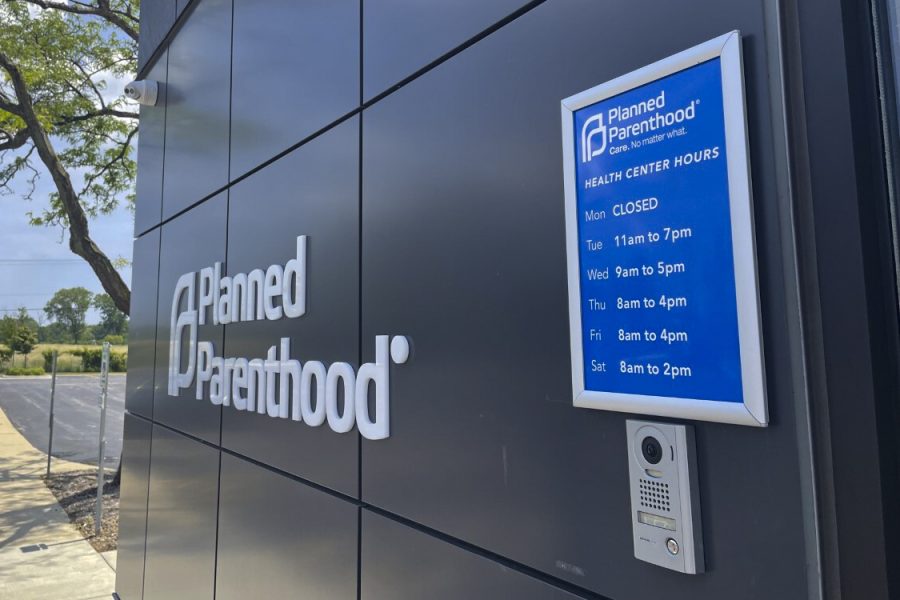Opinion | How to continue to support abortion providers in the coming year
Claire Savage/Report for America via AP, File
A Planned Parenthood health center is shown in Waukegan, IL on June 28, 2022.
January 18, 2023
Planned Parenthood of Western Pennsylvania’s Sara Dixon said last year is hard to sum up. “It was devastating for so many people,” Dixon said. “But then, surprisingly, there were these moments of hope and inspiration.”
The fall of Roe hit Pittsburgh’s two clinics — Planned Parenthood and Allegheny Reproductive Health Center — hard, and they continue to shoulder the majority of abortion seekers from surrounding states. Dixon said the community has rallied around protecting abortion access.
We can’t let that momentum stop. I know that many of us breathed a sigh of relief when record turnout marked the 2022 midterm elections and Democrat Josh Shapiro secured the governorship. His win means that when defending reproductive justice, we don’t have to fight a battle on as many fronts. But, as Dixon explains, it doesn’t mean the fight is over.
“While results of the midterm elections seem to be pro-abortion, we still have a lot to go to ensure our state is an access state,” Dixon said. “Providers and clinics still need to contend with medically unnecessary regulations. And we are still seeing anti-abortion legislation drafted and voted on by state legislators.”
As the spring semester begins and New Year’s resolutions are fresh in our minds, I urge students to commit to reproductive justice work. There are so many ways to support local clinics and defend abortion access. Here are just a few.
- Know about current obstacles to abortion in Pennsylvania.
The regulations Dixon’s talking about derive from the PA Abortion Control Act, passed by the state legislature in 1982. The law includes a state-mandated counseling session for someone seeking an abortion and a 24-hour waiting period before the procedure. Planned Parenthood argues that the information given during the counseling session is meant to discourage people from getting abortions. The information can include counselors discussing links between abortion and cancer, which Planned Parenthood says is misinformation.
The waiting period can seriously complicate people’s plans, especially if they are traveling from another state for the procedure. For those under 18 years old, a parent must consent before an abortion is provided.
The law also states that health plans under the Affordable Care Act, such as Medicaid, do not cover abortion except in narrow circumstances. The law is a consequence of the Hyde Amendment, which the U.S. Congress passed in 1977 and blocks federal Medicaid funding for abortion services. It prevents many low-income communities from using their insurance for an essential health service.
Since 1977, 15 states have begun using their own funds to ensure abortion coverage for Medicaid enrollees. The Women’s Law Project thinks that Pennsylvania should join that list. In October 2022, the Supreme Court of Pennsylvania heard arguments for the case Allegheny Reproductive Health Center v. Pennsylvania Department of Human Services. WLP attorneys said banning abortion coverage under Medicaid violated the Pennsylvania Constitution, which guarantees equality on the basis of sex.
- Keep an eye on legislative threats to abortion access.
Pennsylvania Senate Republicans introduced Senate Bill 106 last summer. It’s a package of constitutional amendments that aims to institute state-wide voter photo ID and weaken the power of the governor. It would make the lieutenant governor an appointed, rather than elected, position, and shift election oversight from counties to solely the auditor general. It also includes an amendment stating that the PA Constitution does not guarantee any “right related to abortion.”
Constitutional amendments are not subject to a governor’s veto. In Pennsylvania, an amendment must pass in both chambers of the state legislature, two sessions in a row. It then becomes a statewide ballot question, also known as a referendum. The package passed in both the Pennsylvania senate and House in July 2022. The state legislature will have to vote on it again this session, and then a referendum can be posed to voters as early as May 2023.
I asked Sara Dixon if she thought more anti-abortion bills could be passed this year. “Honestly, at this point, not much would surprise me,” Dixon said. “I would tell folks to stay diligent and stay on top of the issues, because we know that anti-abortion legislators are sneaky.”
On Jan. 3, Rep Mike Rozzi, generally seen as a moderate Democrat, was elected speaker of the state House by a vote of 115-85, which included 16 Republicans. During his speech, Rozzi announced he was the state House’s “first Independent speaker” and would not caucus with either party. Since then, both parties have tried to insist on his loyalty to them.
Republicans still control the state Senate. Majority of the state House depends on three special elections of Democratic-leaning seats. After a lawsuit from House Republicans sought to delay the elections, a Commonwealth Court panel ruled that they could be scheduled for February.
- Get involved with campus and community organizations.
Campus organizations like Planned Parenthood Generation Action and If/When/How are working to inform and mobilize students. Last year, they hosted events through the Center of Civil Rights and Racial Justice, including the panel “Dobbs v. Women of Color.” PPGen teaches undergraduates about inclusive sexual health, contraception options, consent and abortion access. Last semester, they helped members volunteer with local clinics and made care packages for abortion providers.
There are also organizations in the region, such as Women’s Law Project, a Pittsburgh and Philadelphia-based nonprofit public interest legal organization. Another is New Voices for Reproductive Justice. Co-founded by Rep. La’Tasha D. Mayes, the organization advocates for the holistic health of Black girls, women and gender-expansive individuals. They are part of a coalition currently working on a pro-abortion ballot initiative in Ohio.
- Donate and volunteer.
If you are able, donate to mutual aid funds like the Vivian Campbell Fund and the Western PA Fund for Choice. Planned Parenthood is looking for volunteers to help with community outreach, administrative support, activist work, in clinic support and clinic escorting. You can sign up through their website.
If you want to volunteer with Allegheny Reproductive Health Center, you should connect with the Abortion Defense Committee PGH, which coordinates most of their shifts. The community organizing committee advocates for economic and racial equity and unrestricted abortion access. They help train and schedule volunteers, fundraise, host local demonstrations, deliver food and coffee to clinics and support the unionization of local abortion providers. To get involved, email [email protected].
India studies politics and philosophy and listens to a lot of Joni Mitchell. You can write to her at [email protected].









